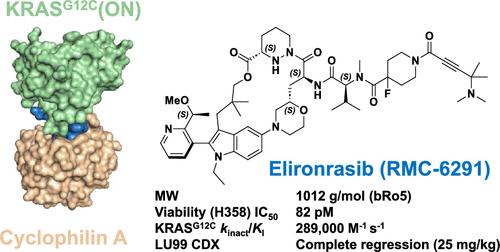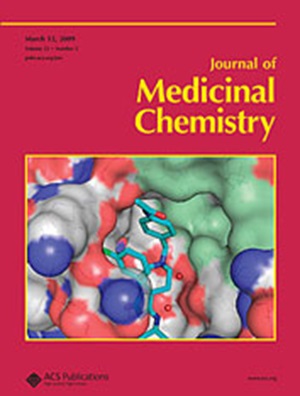Discovery of Elironrasib (RMC-6291), a Potent and Orally Bioavailable, RAS(ON) G12C-Selective, Covalent Tricomplex Inhibitor for the Treatment of Patients with RAS G12C-Addicted Cancers
IF 6.8
1区 医学
Q1 CHEMISTRY, MEDICINAL
引用次数: 0
Abstract
The discovery of elironrasib (RMC-6291) represents a significant breakthrough in targeting the previously deemed undruggable GTP-bound, active KRASG12C. To target the active state of RAS (RAS(ON)) directly, we have employed an innovative tri-complex inhibitor (TCI) modality involving formation of a complex with an inhibitor, the intracellular chaperone protein CypA, and the target protein KRASG12C in its GTP-bound form. The resulting tri-complex inhibits oncogenic signaling, inducing tumor regressions across various preclinical models of KRASG12C mutant human cancers. Here we report structure-guided medicinal chemistry efforts that led to the discovery of elironrasib, a potent, orally bioavailable, RAS(ON) G12C-selective, covalent, tri-complex inhibitor. The investigational agent elironrasib is currently undergoing phase 1 clinical trials (NCT05462717, NCT06128551, NCT06162221), with preliminary data indicating clinical activity in patients who had progressed on first-generation inactive state-selective KRASG12C inhibitors.

发现用于治疗 RAS G12C 依赖性癌症患者的强效口服生物活性 RAS(ON) G12C 选择性共价三联体抑制剂 Elironrasib (RMC-6291)
elironrasib (rmmc -6291)的发现代表了靶向以前被认为无法药物的gtp结合活性KRASG12C的重大突破。为了直接靶向RAS(RAS(ON))的活性状态,我们采用了一种创新的三复合物抑制剂(TCI)模式,包括与抑制剂、细胞内伴侣蛋白CypA和gtp结合形式的靶蛋白KRASG12C形成复合物。由此产生的三复合体抑制致癌信号,在各种KRASG12C突变型人类癌症的临床前模型中诱导肿瘤消退。在这里,我们报告了结构指导药物化学的努力,导致elironrasib的发现,一个有效的,口服生物可利用的,RAS(ON) g12c选择性,共价,三络合物抑制剂。研究药物elironrasib目前正在进行i期临床试验(NCT05462717, NCT06128551, NCT06162221),初步数据表明,在第一代非活性状态选择性KRASG12C抑制剂进展的患者中具有临床活性。
本文章由计算机程序翻译,如有差异,请以英文原文为准。
求助全文
约1分钟内获得全文
求助全文
来源期刊

Journal of Medicinal Chemistry
医学-医药化学
CiteScore
4.00
自引率
11.00%
发文量
804
审稿时长
1.9 months
期刊介绍:
The Journal of Medicinal Chemistry is a prestigious biweekly peer-reviewed publication that focuses on the multifaceted field of medicinal chemistry. Since its inception in 1959 as the Journal of Medicinal and Pharmaceutical Chemistry, it has evolved to become a cornerstone in the dissemination of research findings related to the design, synthesis, and development of therapeutic agents.
The Journal of Medicinal Chemistry is recognized for its significant impact in the scientific community, as evidenced by its 2022 impact factor of 7.3. This metric reflects the journal's influence and the importance of its content in shaping the future of drug discovery and development. The journal serves as a vital resource for chemists, pharmacologists, and other researchers interested in the molecular mechanisms of drug action and the optimization of therapeutic compounds.
 求助内容:
求助内容: 应助结果提醒方式:
应助结果提醒方式:


